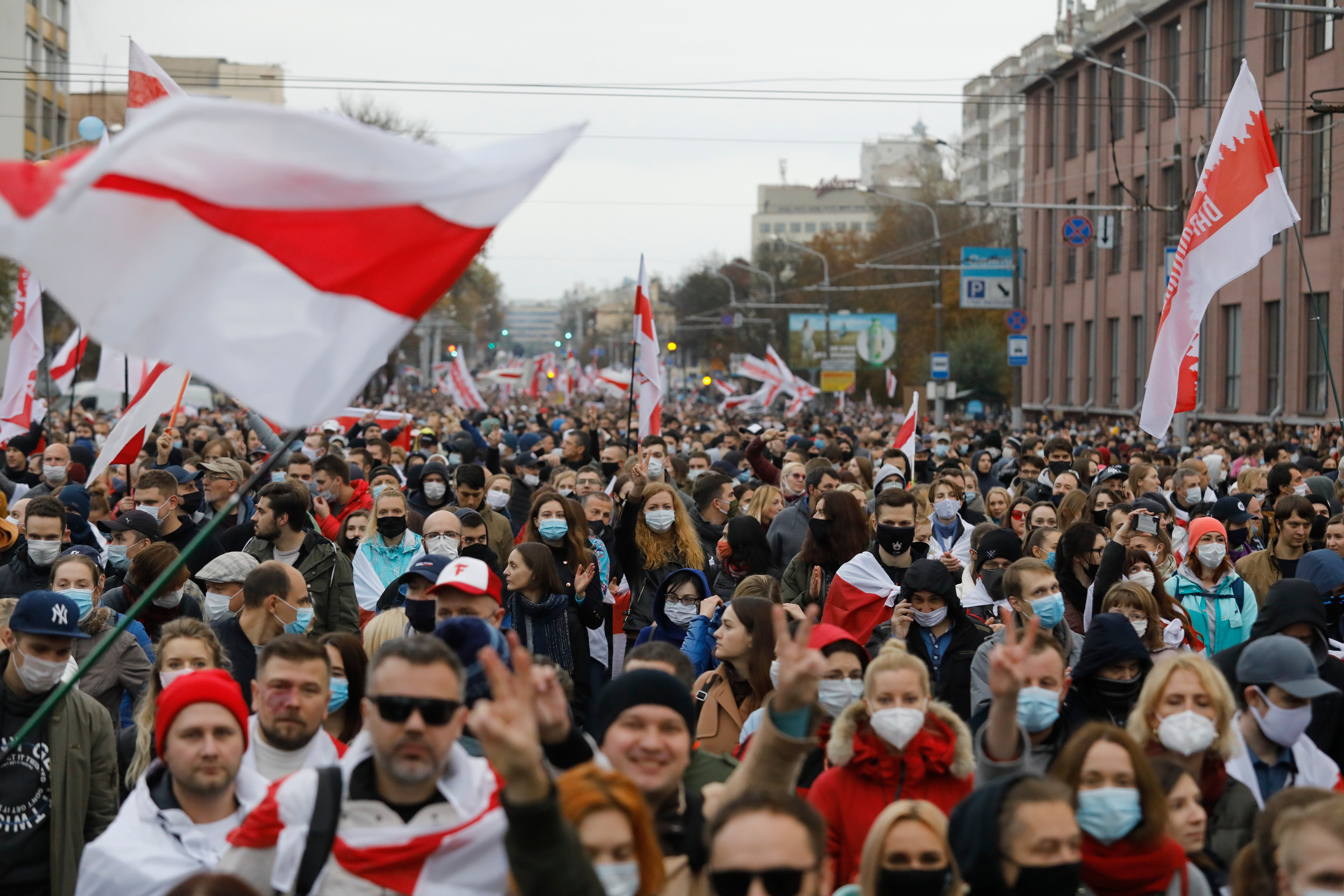Thousands protest as Belarus leader faces demands deadline
Tens of thousands of protesters in Belarus have pressed for the resignation of the country’s authoritarian leader in what human rights activists described as the largest anti-government rally since late August

Your support helps us to tell the story
From reproductive rights to climate change to Big Tech, The Independent is on the ground when the story is developing. Whether it's investigating the financials of Elon Musk's pro-Trump PAC or producing our latest documentary, 'The A Word', which shines a light on the American women fighting for reproductive rights, we know how important it is to parse out the facts from the messaging.
At such a critical moment in US history, we need reporters on the ground. Your donation allows us to keep sending journalists to speak to both sides of the story.
The Independent is trusted by Americans across the entire political spectrum. And unlike many other quality news outlets, we choose not to lock Americans out of our reporting and analysis with paywalls. We believe quality journalism should be available to everyone, paid for by those who can afford it.
Your support makes all the difference.Tens of thousands of protesters in Belarus swarmed the streets of the capital Sunday, pressing for the resignation of the country's authoritarian leader in what human rights activists described as the largest anti-government rally since late August.
Over 200,000 people took part in the demonstration in Minsk the Viasna human rights center said. They carried red and white flags and marched while chanting “Go away!” and “New election!,” references to a disputed presidential vote that returned President Alexander Lukashenko to a sixth term and triggered almost daily protests.
Several subway stations were closed, mobile internet was not working, and water cannons and armored vehicles were seen in the center of Minsk. Rallies also took place in other cities in Belarus, and police detained scores of people across the country. A list of detained protesters released by the Viasna center had over 130 names by Sunday evening.
Mass protests have rocked Belarus for over two months, ever since the official results of the Aug. 9 election gave Lukashenko a landslide victory with 80% of the vote. His main challenger, Sviatlana Tsikhanouskaya, got only 10% of the votes and refused the recognize the outcome as valid, saying it was manipulated.
The post-election rallies have posed a major challenge to Lukashenko, who has run the country for 26 years and relentlessly suppressed opposition and independent media. Early on, authorities tried to quell the unrest with mass detentions and police dispersing crowds with truncheons, stun grenades and water cannons.
According to human rights advocates, some 15,000 people have been detained in Belarus since the election, and over 100 of them were declared political prisoners. But the protests continued despite the crackdown and police threatening to open fire on the demonstrators.
Tsikhanouskaya, who is currently in exile in Lithuania after leaving the country in fear for her safety, threatened to call a nationwide strike for Monday unless Lukashenko announced his resignation, released political prisoners and stopped the crackdown on protesters before then.
“The People s Ultimatum,” as Tsikhanouskaya dubbed her demands, was the theme of Sunday's rally. In a statement from Vilnius, Tsikhanouskaya expressed support for the protesters in Belarus and said the deadline for authorities expires at 11:59 p.m. (2059 GMT) on Sunday.
“If the demands are not met, Belarusians will start the national strike,” Tsikhanouskaya said.
Tsikhanouskaya's calls for a strike fueled the protest and turned up the pressure on Lukashenko, commentators said.
“The sharp increase of the number of protesters was big news for Lukashenko, who has ramped up repressions in recent months, threatened and intimidated in an attempt to quell the wave of the protests,” Ales Bialiatski, director of the Viasna human rights center, said.
Political analyst Alexander Klaskousky echoed his sentiment, calling Tsikhanouskaya's ultimatum an attempt to rally “every one of those who didn't vote for Lukashenko, which comprise the majority of the country.”
“Even if the threat of a strike does not work, it will make the authorities very nervous, because the opposition is clearly trying to take steps towards dual power in the country," Klaskousky said.